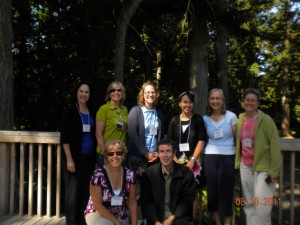If you’ve attended a writing conference, you know how overloaded your brain can feel in the days following. You’re walking on air or schlepping your dashed hopes through the pits, depending on whether you’ve received encouragement or well, not so much encouragement. I witnessed both things at the OCW (Oregon Christian Writers) conference outside Turner, Oregon, and I have a few thoughts on handling your writing life post-conference.
Writing Tip for Today: You may have attended workshops that energized you or unlocked a skill you couldn’t quite grasp before. You may have pitched your work to an editor or agent. These are usual activities at conference, and most of us know the emotions can run from elation to I’m-taking-up-knitting. Whether you’re up or down, consider these things:
My Nonfiction Coaching Class: Weather was great so we held class outside on the deck.
- If you get a business card or manuscript request: You have probably 3-6 weeks to get your requested pages to the person who requested them. Don’t send more than requested. In your cover letter, remind the agent/editor of their request and that you met at conference. Don’t forget to label your submission “Requested Material,” so you aren’t thrown into the slush pile. And whatever happens, whether it’s a yes and the start of something wonderful or no and back to the keyboard, it’s a nice gesture to send a brief thank you when you hear back from the agent/editor.
- The request for a partial manuscript or more is only a request. Agents/editors can’t risk passing up the next breakout bestseller, so it makes sense that they’ll request many more manuscripts than they’ll end up taking. Go ahead and celebrate, but if you’re glued to the ceiling, it’s a long hard fall down to earth. You can be encouraged without quitting your day job and banking prematurely on a simple request for pages. And remember, the interest itself says you are making progress.
- The standard advice to write whatever is hot: Amish, for example, may sound discouraging if that’s far from your heart’s desire. Remember, though that some agents say you might be able to break in with a romance or an Amish novel, while others insist that you should only write what you’re passionate about. Do what feels right to you.
- If you’re told your stuff isn’t ready, try not to get down on yourself. The skill set needed in today’s market requires that you keep up with current trends and practice, practice, practice. Let the dust settle a bit. Take a couple weeks off from that project. Start something new, or experiment with a form you’ve never tried. Take a writing class, get a mentor or revisit your writing goals. Writing is a craft. You can learn a craft. Writing conferences are a key way to learn that craft.







Great advice and I agree with all of it. May I put a link to this post on my conference website? It will be a great help to those who may be attending to hear this ahead of time.
Thanks Linda
Jan
jancline at ymail dot com
Hi Jan,
Sure feel free to link. And if writers just starting out think it’s only them who struggle with these emotions, they’re wrong. Even old-timers like me feel the ups and downs. ~Linda
Thanks Linda. Ive added the link and I appreciate being able to use it. I will be attending 3 conferences next year (my own being one of them) so I’ll need it too!